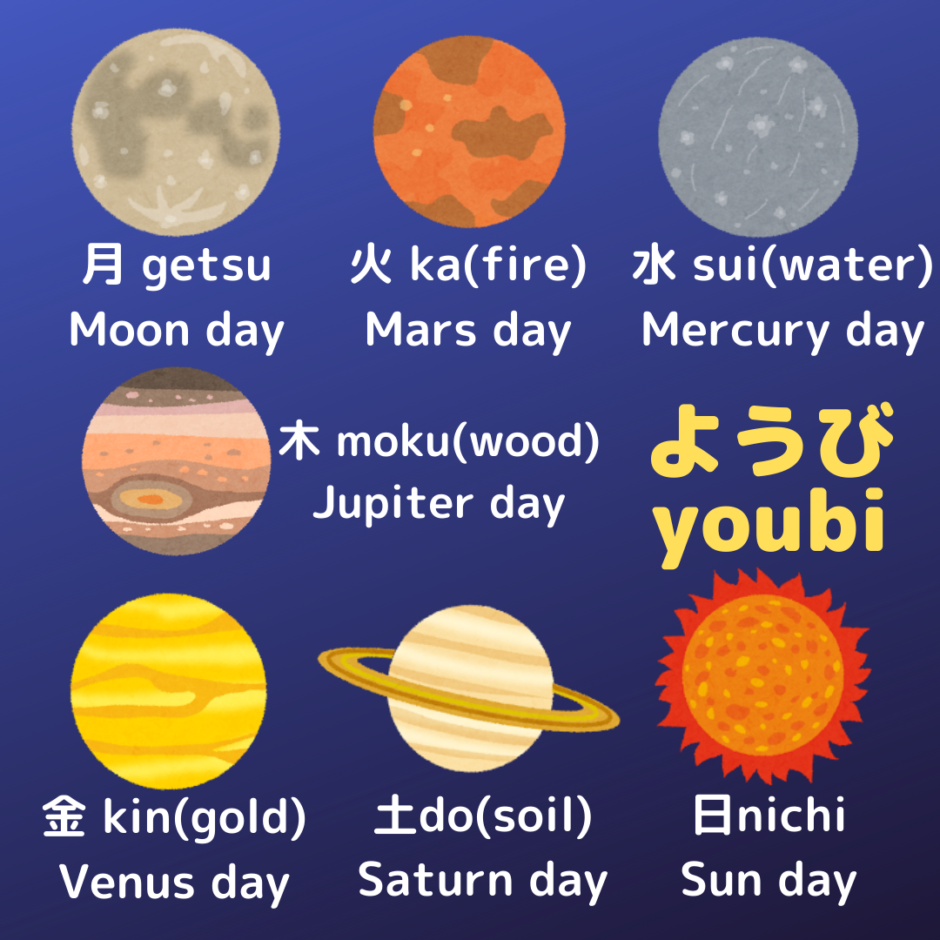Can you write the days of the week in Kanji?
Have you wondered why Wednesday is the “Water” day?
I couldn’t answer that question for a long time,
but I recently Googled about it and figured out that it’s something related to the solar system back in the ancient Greek.
So today I’m going to talk about it.
First of all, in case you haven’t learnt days of the week in Japanese,
here’s the list with the meaning of each Kanji.
| Sunday | Monday | Tuesday | Wednesday | Thursday | Friday | Saturday |
|---|---|---|---|---|---|---|
| 日曜日 | 月曜日 | 火曜日 | 水曜日 | 木曜日 | 金曜日 | 土曜日 |
| にち ようび | げつ ようび | か ようび | すい ようび | もく ようび | きん ようび | ど ようび |
| Nichi- youbi | Getsu- youbi | Ka- yobi | Sui- youbi | Moku- youbi | Kin- youbi | Do- youbi |
| “Sun”day | “Moon” day | “Fire” day | “Water” day | “Wood” day | “Gold” day | “Soil” day |
日=Sun
月=Moon
火=Fire
水=Water
木=Wood
金=Gold
土=Soil
Every-time I teach kanji for days of the week, I always get the question from my students, “moon, fire, water, wood…WHY???”
I’ve kept saying that there’s no reason so you just need to remember,
but I noticed that when I put kanji 星(star)after 火水木金土, they actually become the names of the planets!
火星(かせい ka-sei/Mars)
水星(すいせい sui-sei/Mercury)
木星(もくせい moku-sei/Jupitar)
金星(きんせい kin-sei/Venus)
土星(どせいdo-sei/Saturn)

So when we convert from Nichiyoubi to Doyoubi into the name of the planets, the new chart can be made like this.
| Sunday | Monday | Tuesday | Wednesday | Thursday | Friday | Saturday |
|---|---|---|---|---|---|---|
| 日曜日 | 月曜日 | 火曜日 | 水曜日 | 木曜日 | 金曜日 | 土曜日 |
| にち ようび | げつ ようび | か ようび | すい ようび | もく ようび | きん ようび | ど ようび |
| Nichi-youbi | Getsu-youbi | Ka-yobi | Sui-youbi | Moku-youbi | Kin-youbi | Do-youbi |
| “Sun”day | “Moon” day | “Mars” day | “Mercury” day | “Jupiter” day | “Venus” day | “Saturn” day |
Now, what’s this related to the day of the week?
It goes back to the ancient Greek history.
In the past, when people still thought that the Earth was the center of the planet,
people estimated the distance of each planet from the earth by the speed of movement of the positions against the constellations.
People believed that the slower the planet’s movement, the farther it is from the earth. So the order from the farthest to the closest to the earth, which people used to think, was like this;
Saturn(土)→Jupitar(木)→Mars(火)→Sun(日)→Venus(金)→Mercury(水)→Moon(月)
These planets were thought to take turns dominating 24 hours, one hour at a time, from the farthest ones.
Saturn, which is the furthest from the Earth, dominates for the first hour of the day, then Jupiter for the next hour, Mars, and so on.
So it goes like this;
【Day 1】
1st hour: Saturn(土) 2nd hour: Jupiter(木) 3rd hour:Mars(火) 4th hour: Sun(日) 5th hour: Venus(金) 6th hour: Mercury(水) 7th hour: Moon(月) 8th hour: Saturn(土), “・・・”, 24th hour: Mars(火)
1st hour of the Day 2 is dominated by Sun(日), so it continues like this;
【Day 2】1.Sun(日) 2.Venus(金) 3.Mercury(水) 4.Moon(月) 5.Saturn(土) 6.Jupitar(木) 7.Mars(火), “・・・”, 24.Mercury(水)
Then 1st hour of the Day 3 is dominated by Moon(月)・・・
So it keeps on going like this.
The first star of the day was thought to be the guardian star of the day.
So the first day is Saturday(土 / Saturn), the second day is Sunday(日 / Sun), and the third day is Monday(月 / Moon). Below, the order is familiar: Tuesday (火 / Mars), Wednesday(水 / Mercury), Thursday(木 / Jupiter), and Friday (金 / Venus).
What’s the relation of fire and Mars, Water and Mercury?
That I have to go back to the Greek methodology and also how Chinese culture came to Japan, so I’m not going to write about the details here,
but please have a look at them if you are interested in the origin of the each planet’s name!
I used to teach student that Sui-youbi is water day, Moku-youbi is wood day etc…but now I feel I should tell my students that these kanji came from the solar system!
For those of you who have learned days of the week with me and asked the questions about kanji meaning, I need to apologize that my explanation wasn’t clear enough! Sorry!
I will introduce a fun video using days of the week in Japanese.
This is created for Japanese people to remember English days of the week with fun.
This series is made by NHK. Hope you’ll like it!



